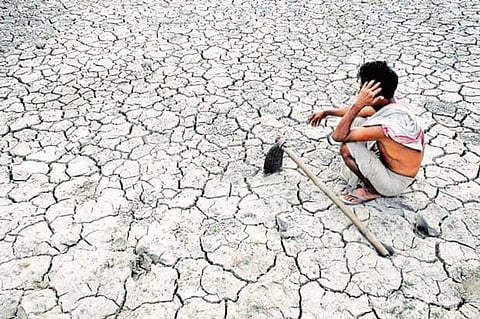
- Union Budget 2026
- Home
- NewsGram USA
- India
- न्यूजग्राम
- World
- Politics
- Entertainment
- Culture
- Lifestyle
- Economy
- Sports
- Sp. Coverage
- Misc.
- NewsGram Exclusive
- Jobs / Internships

By Ishan Kukreti
The Indian farmer is in limelight again, and like always, for all the unhappy reasons.
A farmer died during the rally of Aam Aadmi Party at Jantar Mantar. The Land Acquisition Bill is being widely debated and Rahul Gandhi has lent his unequivocal support for the cause of the farmers. Recently, O.P. Dhankar, Haryana Agriculture Minister, called farmers who commit suicide, 'criminals' and 'cowards.' All this has focused the national attention on the tiller, once more.
But amidst the cacophony of prime time debates, angry questions, decreasing subsidies and unseasonal rains, the Indian farmer remains at the same place, on the margin and highly suicidal.
What's the big deal?
Since independence around 3,00,000 farmers have committed suicide. The highest number of farmer suicides were recorded in 2004, when 18,241 farmers committed suicide, according to National Crime Records Bureau. Division tells that this means, on ever day of 2004, around 50 farmers committed suicide in India. The jet black irony of the situation is that the year of BJP's 'India Shinning' was the darkest for Indian farmers.
Agriculture as an economic activity is fast becoming an option not very viable. The input costs are rising at a rate which the output price is not able to match. Apart from this a long list of problems like decreasing water table, decline in soil fertility due to using fertilizers and chemicals, emergence of pests resistant to chemicals, are killing agriculture in India, along with the agriculturist.
Minimum Support Price Scheme
To secure the position of the farmers, the government started its Minimum Support Scheme in 1966-67. It is the minimum amount at which the government buys grains from the farmers. The scheme provides a guarantee of crop sale to farmers, but as the name suggests, it is a bare minimum amount and is mostly inadequate.
"Government gives Rs. 1,450 for a quintal of wheat, but it doesn't help us. The MSP is worse than charity, it is given just as a formality. We require a minimum of at least Rs. 2,000 per quintal to make things better," says a highly disgruntled Karam Singh Pajja who is a farmer in Bajpur, Uttrakhand, and has 'sold' a crop of sugarcane worth Rs.82,000 to Bajpur Sugar Mill over a month ago but hasn't received the money yet.
It is true that MSP has been increased by the government over the years. But the hike, when viewed keeping in mind the reduced financial assistance of government in activities like irrigation, health and related services, employment schemes etc, turns out to be a mere joke.
Moreover, even the guaranteed MSP comes with a there's-a-rub condition. The government doesn't purchase wheat crop ( one of the most grown crop) with moisture content over 12%. But during the time of harvest, the crop inevitably has moisture content higher than that. To bring it down to 12%, the yield has to be dried in the sun, this also means the requirement of a storage facility and a possibility of loss because of rodents and pests.
Arahati and the hoarding
When the farmer can't sell the produce to FCI ( Food Corporation of India) due to the glitch of moisture content or if he requires a better price, he then turns to the 'Arhati' the middle man who buys the produce from him and sells it in the mandi to retailers.
"The farmer has to recover his money as soon as possible because he has to repay the loans. Arahati buys the produce for a lower price, exploiting the farmers and then makes profit by selling it at a higher rate to retailers and government officials," says Baljit Singh Randhawa, treasurer of the Kisan Union, Uttrakhand.
For a person who thrives on the simple profit and loss principle of reducing cost price and increasing selling price, it is no surprise that the Arhati takes advantage of the farmers' condition.
"It is his business and he does everything to make it profitable. What's it to him if a farmer lives or dies? or whether our kids go to schools or not?" says Ramesh Khartri, who owns farms in Rajasthan.
Postscript
The apathy of government, dishonesty of officials and the greed of Arhati, all are the combined burden which the sisyphus of an Indian farmer sloughs under, generation after generation.
Karam Singh's words in this context, help put things in clear perspective. He says, "Kisan is the only person in Hindustan who is not allowed to fix the price for his goods. The government or the private trader does it for him. He cannot say that I want this much amount for my crop. He too has to send his kids to school, get his daughters married."
